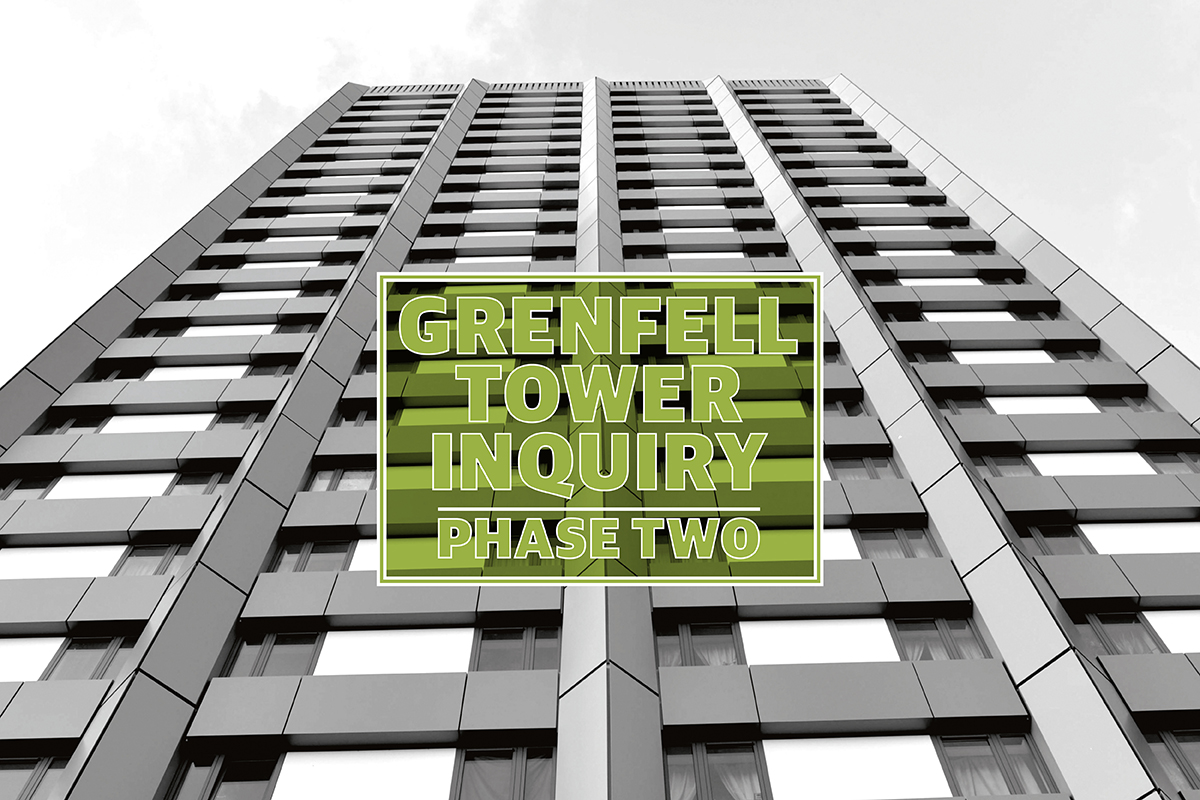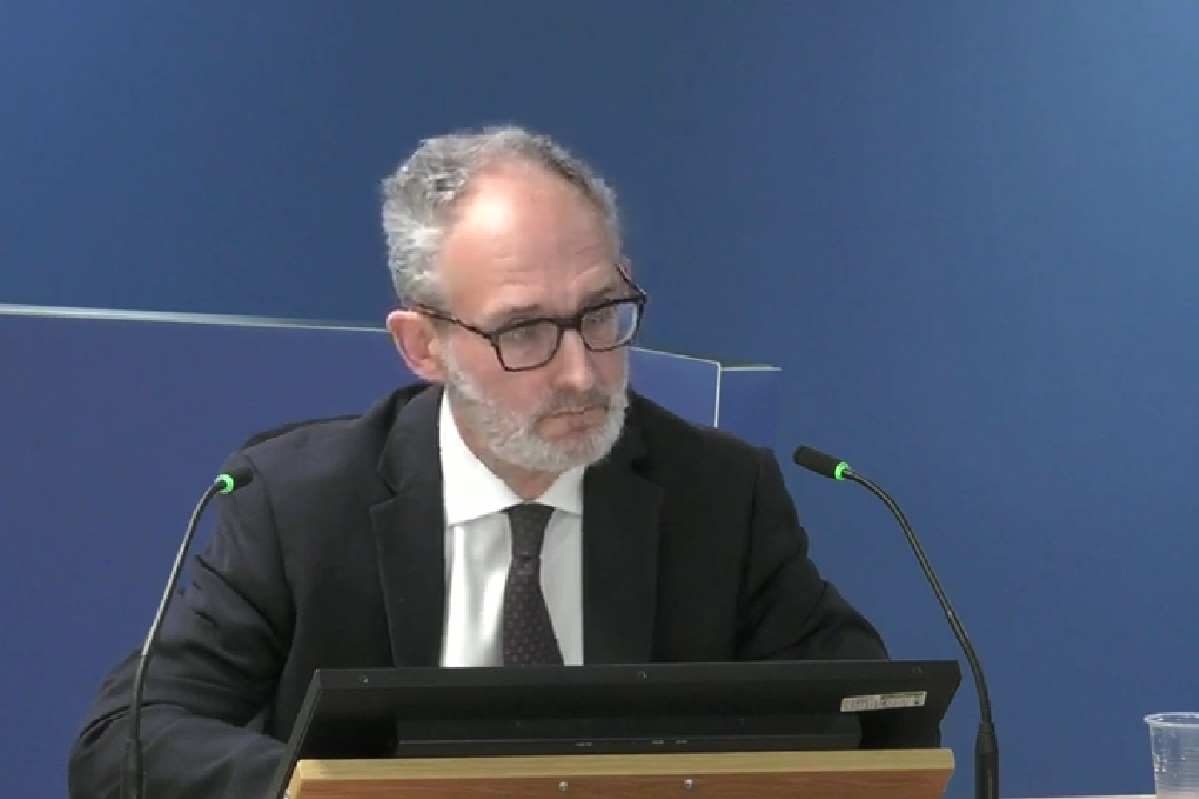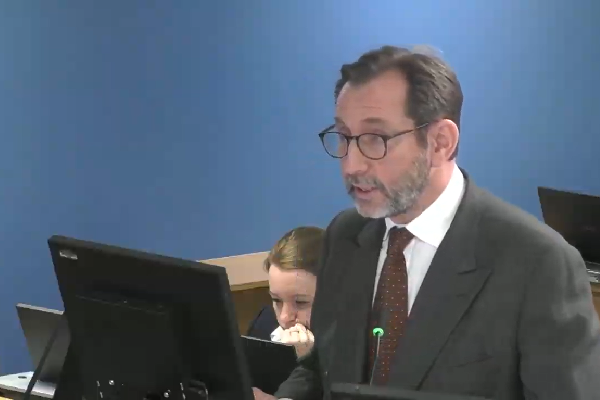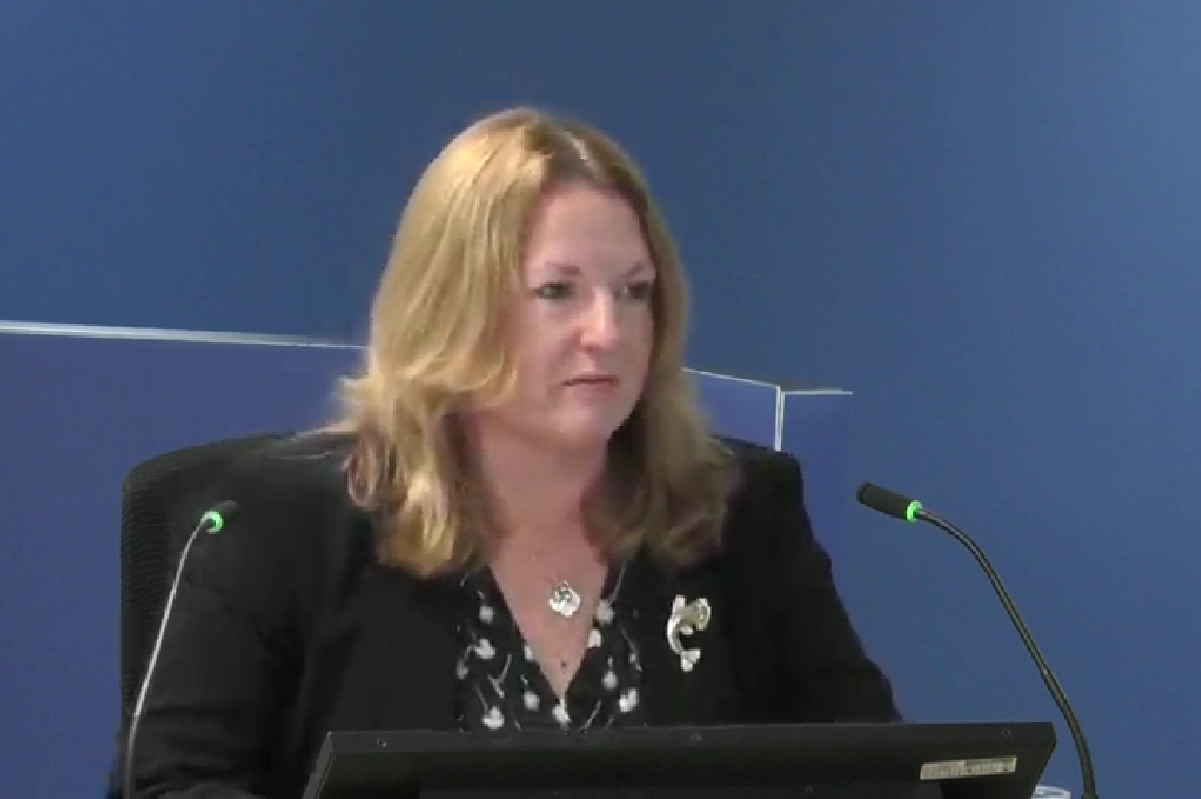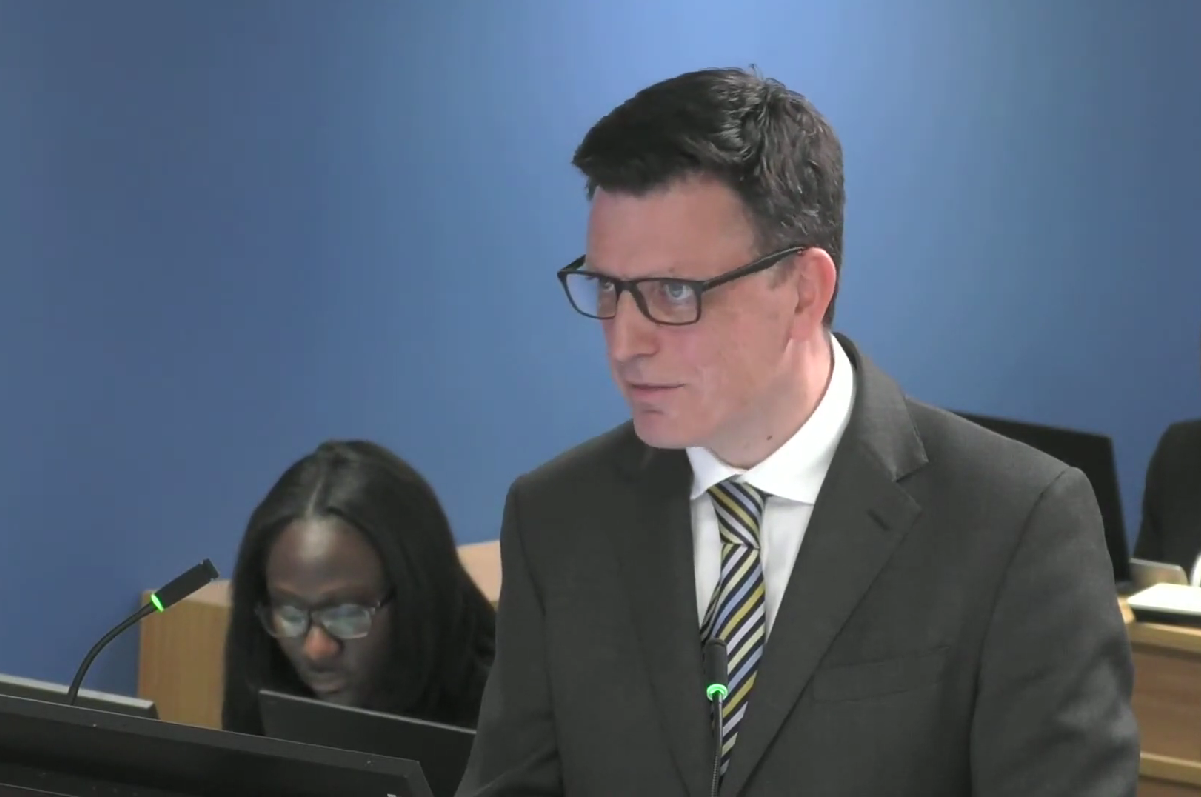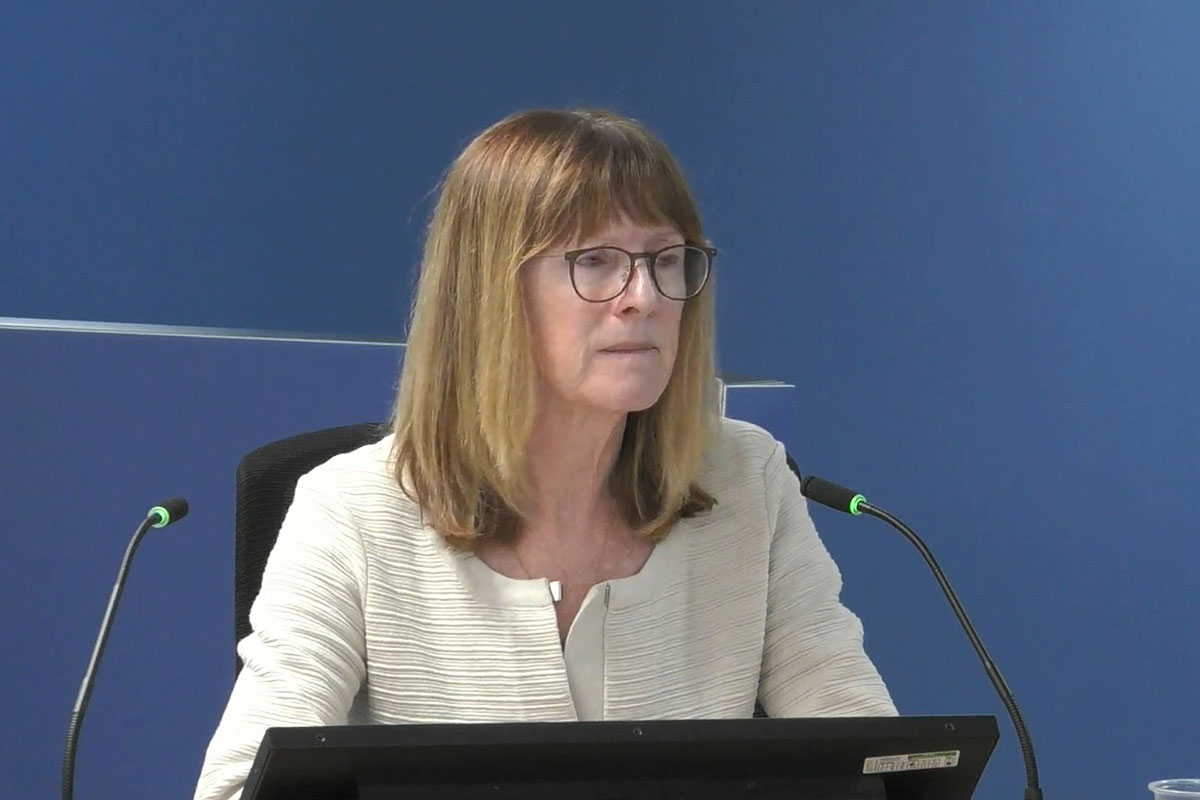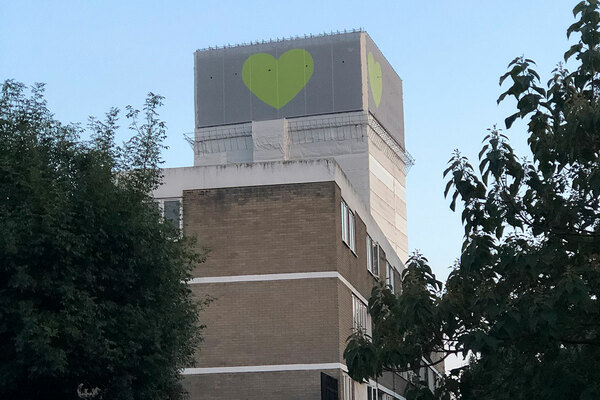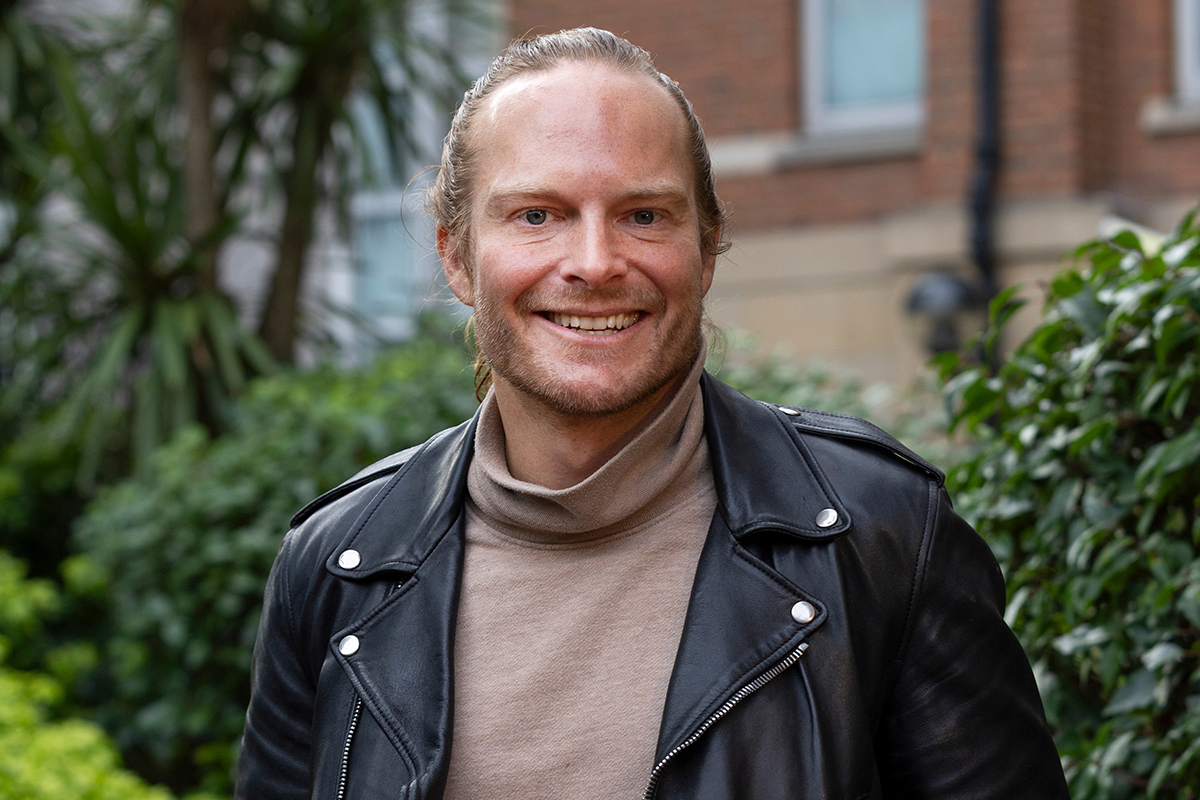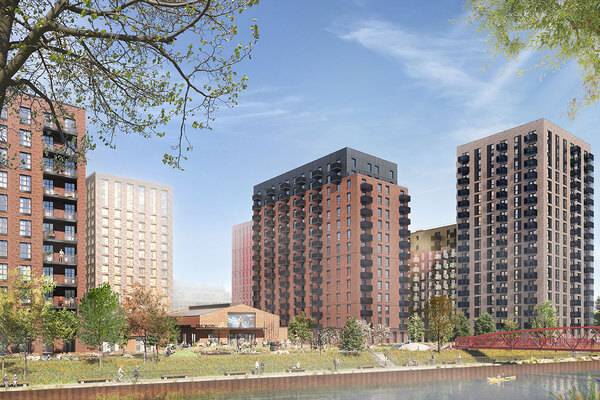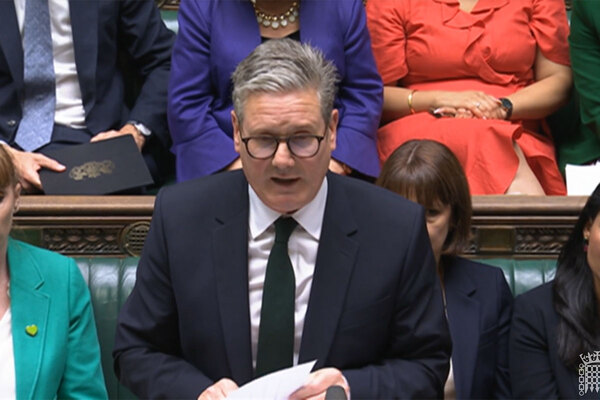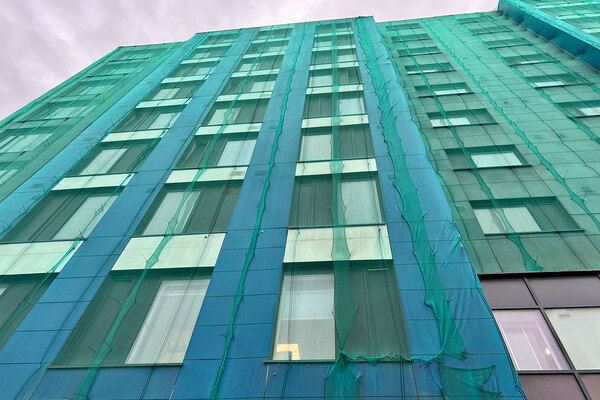Grenfell Tower Inquiry diary week 74: ‘Do you agree that RBKC was ill-prepared and incapable to meet its duties’
This week, Nicholas Holgate, former chief executive of the Royal Borough of Kensington and Chelsea (RBKC), was grilled on his failure to hand over control of the aftermath of the fire, despite the borough’s lack of capacity. Peter Apps reports
‘Do you agree that RBKC was ill-prepared and incapable to meet its duties’
The default arrangement for a disaster is that the local authority in which it happens becomes the ‘category one’ responder, with its chief executive taking the senior position of ‘gold commander’.
With Grenfell, this meant RBKC and Mr Holgate (pictured above) taking charge of the response.
But, as he accepted, the council was “ill-prepared” to take on this critical role and his own training and experience left him “unequipped” to lead the response.
Mr Holgate had limited training in disaster management, which he explained by saying he had reached “the wrong conclusion... that one had to put up with being a generalist”.
For the borough itself, it has already been established that the council had far too few staff in key positions to deal with a disaster, including no one in the pivotal role of humanitarian assistance lead officer (HALO).
This was partly because the borough relied on council officers who held other roles volunteering to be part of the team ready to tackle a crisis, and too few did.
Mr Holgate was warned of this from as early as October 2014, when a report told him there was a “significant shortfall in the numbers of trained volunteer emergency management staff” and called for “support from executive directors” to improve the position.
A further email in January 2016 from David Kerry, emergency planning manager at RBKC, warned Mr Holgate that there were only 11 volunteers for the council’s command centre, when he would like at least 20. By the time of the fire, only three managers were trained despite Mr Kerry recommending 10.
Emails from a few months before the fire also warned there were “very few” staff trained to work in emergency rest centres.
A big difficulty was that pressures of the “day job” prevented staff from carrying out the necessary training as volunteers, with no new volunteers coming forward following a recruitment drive that occurred in 2014.
Why did the council not pay staff for these roles, or make it part of their official job, as happened in other boroughs?
“I think we were probably stuck with a practice that we should have changed,” said Mr Holgate.
RBKC was also required to “exercise” its plan for a major emergency annually by its own internal documents – something it did not do.
The inquiry also heard that the borough’s readiness for a disaster was assessed against the minimum standards required for London in February 2016 and was found to be behind in several key areas.
“Do you agree… that RBKC, at least in those respects, was ill-prepared and incapable to meet its duties as a category one responder at the time of the fire?” asked Richard Millett QC, lead counsel to the inquiry.
“I think ill-prepared,” Mr Holgate replied. “I don’t know how incapable we should have been even with those deficiencies.”
‘Do you accept that at least an aspect of your reluctance to invoke London Gold was that it would have been politically damaging to the council?’
Given this background, a pertinent question in this phase of the inquiry is why RBKC did not seek outside help, or immediately hand over control to London Local Authority Gold – a collective mechanism that would have mobilised support from all 33 local authorities in the capital.
As the inquiry has heard, Mr Holgate was promptly advised to do so by Mr Kerry.
The evidence varies, but at a meeting at either 6.30am or 10am on the morning of the fire, Mr Kerry is said to have advised the chief executive that the disaster was “ bigger than any one local authority in London can manage” and that “consideration should be given to asking for mutual aid”.
But Mr Holgate did not, with one log of the events recording that he said: “That looks like we can’t cope.”
“The conversation on mutual aid at that point ceased,” the log records.
Asked if he made this comment, Mr Holgate said it was “not a happy choice of words”, but “if that’s what [the officer who wrote the log] recalls, I’m very happy to accept them”.
He added: “What I mean by that is that, however erroneously, I thought that the borough could achieve the tasks immediately in front of it, and, yes, we would need reinforcement, but the reinforcement could be specific and as necessary. It did not need to be put into a different process entirely.”
“Just to be clear, are you quite sure that… you weren’t at the time feeling a need to protect the council’s reputation from inevitable criticism about being understaffed or having the lack of preparedness or capability?” asked Mr Millett (pictured above).
“Absolutely not, and indeed if I had had that uppermost in my mind, it would have been a completely self-defeating proposition and I would not have entertained it,” Mr Holgate replied.
The inquiry then saw a string of emails from figures in neighbouring boroughs and central government offering varying levels of support to RBKC over the course of the day.
But Mr Holgate knocked them back, writing in one email that “we should be able to manage” and in another that “we think we are coping”.
“Would you agree… that the consistent message from you to those who offered help from early on on the 14th of June, was that RBKC was managing and didn’t need help?” asked Mr Millett.
“I thought we were managing, yes,” replied Mr Holgate.
The inquiry then saw a stream of emails from his own councillors warning him of various problems with the response.
This included housing lead Rock Feilding-Mellen describing the main respite centre for survivors at the Westway Leisure Centre as “chaos” and asking when a manager would be arriving in the afternoon after the fire.
“We are the frontline and are having to take all the blame for this,” wrote another councillor, citing the bereaved and survivors’ frustration with the lack of communication. “We really need help and support, please.”
Asked if he accepted there had been a “number of areas of concern” about the response raised with him and “many of them focused on the paucity of the communication response”, Mr Holgate replied: “Yes, yes, absolutely.”
He said that the “penny dropped” on Thursday 15 June, the day after the fire, that RBKC was not coping, as media reports on the lack of response began to “percolate” and he began to realise the strength of anger against the council from those who lived in the tower.
At 3.30 in the afternoon, he dialled in to a meeting with ministers to discuss the response. A witness statement from a civil servant, also on the call, recorded that Mr Holgate “was not able to answer detailed questions about the situation on the ground and appeared quite defensive, trying to assure ministers that no additional help was required”.
Another recorded surprise that he was “unable to articulate any plan beyond the immediate for rehousing or supporting those affected” and that she felt RBKC was “overwhelmed” by the scale of the disaster.
In a call with other London leaders at 5pm, where further concern was expressed about RBKC’s handling of the crisis, Mr Holgate finally invoked the ‘London Gold’ arrangements.
“Was it the case that, in fact, by finally agreeing to trigger London Gold at 5pm on the evening of the 15th, you were reluctantly responding to external pressure due to growing concerns about the council’s inability to lead on the response effort?” asked Mr Millett.
“Yes,” replied Mr Holgate.
He handed over control to John Barradell, chief executive of the City of London, over the course of the next day. In one briefing, Mr Barradell was told: “General community feeling is of hurt and anger. This is being stoked by a small number of known local instigators who continue to fabricate stories in order to further their aims.”
Asked to explain these comments, Mr Holgate said that they reflect “a suspicion that in among a great deal of completely genuine and justified criticism, it was within the scope of a handful of people, who were all the time, well before the fire, extremely antagonistic to the council, to make matters even worse”.
Asked if he was seeking to “deflect attention away from the failings of the council”, Mr Holgate said he was not.
“Do you accept, having seen the evidence that we have been going through together, that at least an aspect of your reluctance to invoke [London] Gold until late Thursday the 15th was that it would have been politically damaging to the council?” asked Mr Millett.
“No, I don’t accept that, actually,” replied Mr Holgate. “If I’d thought that RBKC could not cope, then it would have been madness to have carried on just because it was embarrassing to admit as much… That is not part of my make-up.”
On 20 June 20, Mr Holgate resigned as chief executive after then-communities secretary Sajid Javid told council leader Nicholas Paget-Brown to remove him.
In his witness statement, Mr Holgate said this was “entirely unjust and inappropriate” but they had to comply in order to maintain the support of Mr Javid’s department.
“‘Abandoned’ is a word that the inquiry’s heard to describe how those placed in hotels felt”
Before Mr Holgate, the inquiry heard from Laura Johnson (pictured above), then director of housing at RBKC, whose team led the efforts to find emergency accommodation for those displaced by the fire.
For those who fled the building itself, this meant hotels. But this was a tough process – booking hundreds of hotel rooms in central London during the summer season is no mean feat.
Nonetheless, RBKC potentially made this harder for themselves than they might have done by having no pre-existing agreements in place with local hotels to put up residents during an emergency.
This meant hotels were demanding payment up front and RBKC did not always have high enough limits on credit cards to pay. This made booking difficult, and some staff went as far as paying on their own personal bank accounts to secure rooms.
“In terms of a lesson learned, having perhaps an agreement in advance with hotels and a plan in relation to that may perhaps have avoided such a problem?”
“It may well have helped if we had had an agreement in advance with somebody like the Hilton Group,” replied Ms Johnson, adding that the “sheer scale” of the issue meant the problems might have emerged anyway.
These difficulties – and issues where only a short booking could be obtained – meant some families were ordered out of the hotels at short notice, with some having to move several times in just a few days.
Around a third of the people found a hotel had to be moved within a few days.
“Would you accept that this was highly disruptive and negatively impacted those that had been placed in those hotels initially?” asked counsel to the inquiry Dermot Keating.
“Yes,” replied Ms Johnson. She said while the council tried to visit everyone who had been placed in hotels the day after the fire, there were unable to in many cases. This meant many residents were ordered out of the room by management and did not know where to go.
There were also several instances where hotels were unsuitable: families found that they had been placed in single rooms, those with babies were not provided with cots, and those with older relatives with conditions such as dementia were left without support.
“Do you accept that in those first seven days… a significant number of those placed [in hotels] did not have their needs sufficiently or properly catered for?” asked Mr Keating.
“We did our very best to try and place people somewhere in a very difficult situation and we didn’t get it right on every occasion. And for that I can only apologise because it certainly wasn’t the intent,” Ms Johnson replied.
The inquiry also saw an email from a housing officer at Hammersmith & Fulham Council, which raised concerns that survivors who had been placed in a Premier Inn in their borough had not been contacted by RBKC.
“There are 12 families who had not been contacted by Kensington and Chelsea since placement or six days ago. We were the first to visit them at their hotel,” he wrote.
“They have no idea regarding what happens next. They’ve not been provided with contact details for Kensington and Chelsea. They received two meals per day, breakfast and dinner, but not have not received any cash subsistence.”
“Do you acknowledge that this shouldn’t have happened and leaving these families in this position was unacceptable?” asked Mr Keating.
“Yes, I acknowledge it must have been extremely difficult for those families to be left in that state of limbo, not knowing what was going to take place next,” Ms Johnson replied.
“‘Abandoned’ is a word that the inquiry’s heard to describe how those placed in hotels felt,” said Mr Keating. “Do you accept, both at hotels within the borough and outside the borough, that communication and contact with those people in hotels was deficient?”
“I acknowledge that we could have done more to contact those families,” Ms Johnson said. “It was a very pressured environment… and we didn’t give enough attention to the people that had been placed and giving them information and updates about what they could expect.”
‘Do you accept that was in part a consequence of this passive approach by RBKC?’
As well as those who had lived in Grenfell Tower, 845 residents from ‘The Walkways’ – low rises connected to the main block – were also rendered homeless on the day of the fire.
They had been evacuated from their homes by the police and were not allowed to return, with a cordon in place around the tower.
Their homes were also damaged: the police had forced entry to some, others were flooded with water from firefighters’ hoses, and heating, hot water and cooking facilities were unavailable because the communal gas boiler had been damaged.
But RBKC did not think it had the capacity to find all of these people hotel rooms and they were told to stay with friends and family “in the first instance”.
Where they could not, some were provided with hotel accommodation, but this was limited to the vulnerable, older and those with children.
Instead, many others were asked to bed-down on temporary mattresses in a large hall at the Westway Sports Centre near the tower.
There was also confusion on the ground about what these residents were entitled to, with some refused entry to rest centres or told they would not be given support.
This had painful consequences, with evidence emerging that many people from these homes spent the first night simply sleeping rough.
A log for the council’s command centre recorded British Red Cross staff noting that at 11.30pm on the day of the fire, they had “seen people sleeping on the streets who don’t appear to know about Westway being a relief centre overnight”.
Other records noted people sleeping rough on a street near the tower. A local authority staff member on the scene said he had asked police to check on them, but “police said [they] don’t have the capacity to send an officer” as they were “winding down”.
A separate log prepared by the Kensington and Chelsea Tenant Management Organisation (KCTMO) recorded incidents of residents sleeping in the park near the tower, under a flyover on the estate and a mother with two children who slept in a car.
“Do you accept that was in part a consequence of this passive approach by RBKC and poor communication regarding the eligibility criteria, both internally and externally, regarding temporary accommodation?” asked Mr Keating (pictured above).
Ms Johnson said she did not believe the council’s approach had been “passive”, but did accept that “there were people who unfortunately did not did not receive the level of care that they should have done”.
The next day, the council decided that people from the Walkways should be moved back home “as quickly as possible”, despite the poor condition of their homes.
Ms Johnson said the “sheer volume” of accommodation required meant that “either people can go home and realise that it’s far from perfect or that they can stay in an emergency rest centre”.
“It’s a very difficult decision to take when you’re looking for hundreds and hundreds of units of accommodation in a very busy capital city,” she said.
‘It surprised me that no one else stepped up to do this role’
On Tuesday, the inquiry had heard from Sue Redmond (pictured above), interim executive director of adult social care and public health at RBKC, who took over the ‘HALO’ role on the day of the fire.
A HALO is responsible for bringing together organisations, such as the police and the voluntary sector, to oversee the humanitarian response and was described as “pivotal” in the evidence this week.
However, as discussed above, this is a role RBKC had failed to fill in the years before the fire, with Ms Redmond’s colleagues ruling themselves out because they were “too busy” to take on the commitment.
As a result, Ms Redmond, who had only worked in the borough since April 2017, took on the role at the same time as leading the adult social care team’s work on the day of the fire.
“It surprised me that no one else stepped up to do this role,” she said.
“So you had – is this right? – to be colloquial about it, a ‘Why me?’ moment?” asked Mr Millett.
“Yes,” she replied.
Ms Redmond said staff at the command centre were like “rabbits in the headlights” on the day of the blaze.
The inquiry continues.
Sign up for our weekly Grenfell Inquiry newsletter
Each week we send out a newsletter rounding up the key news from the Grenfell Inquiry, along with the headlines from the week
Already have an account? Click here to manage your newsletters
Grenfell Tower Inquiry phase two: weekly diaries
Module one: the refurbishment
Week one: A vivid picture of a broken industry
After a week of damning revelations at the opening of phase two of the Grenfell Tower Inquiry, Peter Apps recaps the key points
Click here to read the full story
Week two: What is the significance of the immunity application?
Sir Martin Moore-Bick has written to the attorney general requesting protection for those set to give evidence at the Grenfell Tower Inquiry. Peter Apps explains what the move means
Click here to read the full story
Week three: Architects of misfortune
This week saw the lead architects for the Grenfell Tower refurbishment give evidence to the inquiry. Peter Apps runs through the key points
Click here to read the full story
Week four: ‘I didn’t have any perception that it was the monster it’s become’
The architects continued to give evidence this week, outlining a lack of understanding of the fire risk posed by the cladding materials and its design. Nathaniel Barker reports
Click here to read the full story
Week five: ‘No adverse effect in relation to external fire spread’
As the Grenfell Tower Inquiry returns from its long absence, Peter Apps recaps the key points from a week of important evidence from the fire consultants to the refurbishment
Click here to read the full story
Week six: ‘I can’t recall any instance where I discussed the materials with building control’
Nathaniel Barker summarises what we learned from fire engineers Exova, architects Studio E and the early evidence from contractor Rydon
Click here to read the full story
Week seven: ‘I do not think I have ever worked with a contractor operating with this level of nonchalance’
Two key witnesses from contractor Rydon gave evidence this week. Peter Apps recaps some of the key points from a revealing week of evidence
Click here to read the full story
Week eight: ‘It haunts me that it wasn't challenged’
Four witnesses from contractor Rydon gave evidence this week. Lucie Heath recaps what we learned on the last week of evidence before the inquiry breaks for five weeks
Click here to read the full story
Week nine: ‘All I can say is you will be taken out for a very nice meal very soon’
This week the inquiry heard evidence from witnesses at Harley Facades, the sub-contractor responsible for Grenfell Tower’s cladding. Peter Apps recaps the key points
Click here to read the full story
Week 10: ‘As we all know, ACM will be gone rather quickly in a fire!’
As the Grenfell Tower Inquiry entered its 10th week, Jack Simpson recaps the key points from a week of important evidence from the refurbishment’s cladding contractor
Click here to read the full story
Week 11: ‘Did you get the impression Grenfell Tower was a guinea pig for this insulation?’
With witnesses from the cladding subcontractor, the firm which cut the deadly panels to shape and the clerk of works which inspected the job giving evidence this was week full of revelations. Peter Apps recaps the key points
Click here to read the full story
Week 12: ‘Would you accept that was a serious failing on your part?’
With the surveyor who inspected Grenfell Tower for compliance giving evidence, this was a crucial week from the inquiry. Dominic Brady and Peter Apps report
Click here to read the full story
Week 13: ‘Value for money is to be regarded as the key driver for this project’
With consultants to Kensington & Chelsea Tenant Management Organisation (KCTMO) giving evidence, attention at the Grenfell Tower Inquiry turned for this first time to the actions of the TMO and the council. Peter Apps reports
Click here to read the full story
Week 14: ‘Did it not occur to you at this point that your budget was simply too low?’
This week, for the first time in phase two, the inquiry heard from Kensington & Chelsea Tenant Management Organisation, the landlord that oversaw the fatal refurbishment of Grenfell Tower. Lucie Heath reports
Click here to read the full story
Week 15: ‘Have you ever informed the police that you destroyed documents relevant to their investigation?’
Witnesses from the Kensington and Chelsea Tenant Management Organisation (KCTMO) gave evidence for a second week, which began with a shocking revelation about withheld and destroyed evidence. Peter Apps recaps
Click here to read the full story
Week 16: ‘I conclude this was very serious evidence of professional negligence’
This week saw members of Kensington & Chelsea Tenant Management Organisation finish giving evidence, before the inquiry’s expert witnesses took the stand to make some highly critical assessments of the work they had seen before and during the refurbishment of Grenfell Tower. Jack Simpson recaps
Click here to read the full story
Grenfell Tower: a timeline of the refurbishment
Following the conclusion of module one of the Grenfell Inquiry’s second phase, Peter Apps presents a timeline of the key moments during the fatal refurbishment of the west London tower block
Click here to read the full story
Module two: the cladding products
Week 17: ‘It’s hard to make a note about this because we are not clean’
The start of the second module of the Grenfell Tower Inquiry phase two came with some huge revelations about the companies that sold the products used in the cladding system. Peter Apps reports
Click here to read the full story
Week 18: ‘It was just reckless optimism wasn't it?’
As the inquiry began cross-examining witnesses for the second module of its phase two work, the picture surrounding just how Grenfell Tower ended up wrapped in such dangerous materials became a little clearer. Nathaniel Barker was keeping an eye on proceedings
Click here to read the full story
Week 19: ‘And that was intentional, deliberate, dishonest?’
The Grenfell Tower Inquiry this week heard the shocking story of how the insulation manufacturer “manipulated” official testing and marketed its product “dishonestly”. Peter Apps tells the story
Click here to read the full story
Week 20: ‘We were outed by a consultant who we then had to fabricate a story to’
This week the inquiry investigated the actions of Kingspan – the manufacturer of one of the insulation products used in the tower’s cladding system. Dominic Brady reports
Click here to read the full story
Week 21: ‘It’s there in black and white isn't it? We see a complete absence of any consideration of life safety’
The story of insulation giant Kingspan’s testing and marketing of its combustible insulation for high rises was unpacked in minute detail this week. Peter Apps reports
Click here to read the full story
Week 22: ‘All we do is lie in here’
In the third week of evidence from insulation giant Kingspan, the inquiry continued to uncover shocking details about the firm’s behaviour both before and after the Grenfell Tower fire. Lucie Heath reports
Click here to read the full story
Week 23: ‘That would have come as an earthquake to you at the time, would it not?’
This week the inquiry took its deepest dive yet into the inner workings of the cladding manufacturer whose product has been blamed for the terrible spread of fire up Grenfell Tower. Nathaniel Barker reports
Click here to read the full story
Week 24: ‘Do you accept that Test 5B was Arconic's deadly secret’
The president of the firm that made and sold the cladding panels installed on Grenfell Tower was asked to account for the apparent concealment of “disastrous” fire tests on the product this week. Peter Apps reports
Click here to read the full story
Week 25: ‘This is quite an incredible list of omissions and missed instances, isn’t it?’
This week the Grenfell Tower Inquiry heard its first witnesses from the Building Research Establishment (BRE) - the testing house which carried out key fire tests on the Kingspan and Celotex insulation products which were later used on Grenfell Tower. Peter Apps reports.
Click here to read the full story
Week 26: 'You were taking an enormous risk, weren't you?'
Week 26 at the Grenfell Tower Inquiry was a key moment in understanding how dangerous products used on the tower came to be accepted by industry professionals. Dominic Brady reports
Click here to read the full story
Week 27: ‘What will happen if one building made out [of] PE core is in fire and will kill 60 to 70 persons?’
The most explosive evidence this week at the Grenfell Tower Inquiry came from those who did not attend, as the evidence which would have been presented to Arconic witnesses was displayed in their absence. Peter Apps reports
Click here to read the full story
Week 28: ‘This is a serious safety matter’
This week the Grenfell Tower Inquiry zeroed in on the British Board of Agrément, the body that produced “misleading” certificates which inspired trust in both the cladding and insulation used on the tower. Lucie Heath reports
Click here to read the full story
Week 29: ‘Is it true that Kingspan’s position… was to do its best to ensure that science was secretly perverted for financial gain?’
The final week in this section of the Grenfell Tower Inquiry primarily examined the attempts by insulation manufacturer Kingspan to lobby government after the fire. Peter Apps reports
Click here to read the full story
How the products used in Grenfell Tower's cladding system were tested and sold
As the section of the Grenfell Tower Inquiry examining how the products used in the cladding system were tested, marketed and sold comes to a close, Peter Apps summarises what we have learned about each of the products included in the system
Click here to read the full story
Module Three: the management of the tower
Week 30: ‘There is certainly a high probability that in the event of a fire the whole building can become an inferno’
The focus of the inquiry shifted this week to the actions of the social housing providers responsible for maintaining Grenfell Tower. Pete Apps recaps what we learned
Click here to read the full story
Week 31: ‘If we cannot get out people will die’
This week saw the former residents of Grenfell Tower enter the witness box to tell of their experiences attempting to raise complaints with the council and its managing agent. Pete Apps reports
Click here to read the full story
Week 32: ‘Let's hope our luck holds and there isn't a fire’
This week saw the return of the landlord of Grenfell Tower, Kensington and Chelsea Tenant Management Organisation (KCTMO), as senior staff members attempted to explain how vital fire safety protections at the block were allowed to fall into disrepair. Lucie Heath reports
Click here to read the full story
Week 33: ‘Isn't that a serious gap in the scope of a policy meant to safeguard vulnerable people?’
A slightly disjointed week at the Grenfell Tower inquiry saw further evidence from staff at building manager Kensington and Chelsea Tenant Management Organisation (KCTMO) interspersed with the views of a cladding expert. Peter Apps reports
Click here to read the full story
Week 34: ‘Some members of the community are doing their best to spread false information’
Jack Simpson covers all the major revelations from the past week of evidence at the Grenfell Inquiry, including evidence from Laura Johnson, director of housing at the Royal Borough of Kensington and Chelsea.
Click here to read the full story
Week 35: ‘I really didn’t like the champagne’
This week the Grenfell Tower Inquiry saw council witnesses, including former deputy leader Rock Feilding-Mellen and leader Nicholas Paget-Brown, questioned about their role in the story for the first time. Peter Apps reports
Click here to read the full story
Week 36: ‘Is that not a very incurious approach for a fire risk assessor?’
This week the Grenfell Tower Inquiry scrutinised the work of Carl Stokes, the man hired to carry out fire risk assessments for the block. Nathaniel Barker reports
Click here to read the full story
Week 37: ‘In giving that advice, weren’t you acting beyond your knowledge and expertise?’
A curtailed week at the Grenfell Tower Inquiry saw fire risk assessor Carl Stokes grilled over advice he gave regarding the tower’s cladding. Peter Apps reports
Click here to read the full story
Week 38: ‘Well it’s a bit more than that, isn’t it. He’s suggesting that you tell the LFB a lie’
The inquiry heard the mammoth cross-examination of KCTMO’s health and safety manager Janice Wray this week. Peter Apps reports
Click here to read the full story
Week 39: ‘What you said there was a grotesque understatement’
This week the inquiry continued to hear from former employees of Kensington and Chelsea Tenant Management Organisation, as well as two employees from the London Fire Brigade. Lucie Heath reports
Click here to read the full story
Week 40: ‘An exercise in concealment and half-truth’
Former KCTMO chief executive Robert Black gave his evidence to the inquiry this week and was asked to account for the various failures described over the previous six weeks. Peter Apps and Nathaniel Barker report.
Click here to read the full story
Week 41: ‘We should do nothing. This is not the sort of website we should be responding to’
This week saw the return of Robert Black, chief executive of Kensington and Chelsea Tenant Management Organisation (KCTMO), before the inquiry turned its attention to the defective smoke control system in the tower. Dominic Brady reports
Click here to read the full story
Week 42:‘They would leak as much as they leaked. They were what they were’
The Grenfell Tower Inquiry continued its in-depth investigation of the tower’s non-compliant smoke control system this week, with evidence from the various contractors involved in delivering it. Pete Apps reports
Click here to read the full story
Week 43:‘Contractors at the time were not generally aware of the importance of leaving holes unsealed’
This week the inquiry focused on two of the more overlooked areas of the Grenfell Tower fire, with evidence focusing on the gas pipelines and lifts within the west London block. It was a packed week, with five witnesses giving evidence. Jack Simpson reports
Click here to read the full story
Week 44:‘I've never seen a fully compliant firefighting lift in any local authority building, to this day actually’
This week the inquiry turn the focus onto the building’s defective lifts, with evidence from an expert, contractors who worked on them and a former engineer at KCTMO. Pete Apps reports.
Click here to read the full story
Week 45: ‘Don’t you find all this rather a surprising debate, given that the Equality Act was passed in 2010?’
The inquiry heard from expert witness Colin Todd this week, who gave his views about the work of risk assessor Carl Stokes as well as answered questions about his own guidance. Peter Apps and Nathaniel Barker report
Click here to read the full story
Week 46: ‘I think I've been very, very clear that is completely wrong’
This week the inquiry heard further expert evidence about fire risk assessor Carl Stokes’ actions, as the section of its work covering the management and maintenance of the tower concluded. Peter Apps reports
Click here to read the full story
Six key failures in the way Grenfell Tower was managed before the fire
Peter Apps recaps some of what we have learned about the actions of the Royal Borough of Kensington and Chelsea (RBKC) and Kensington and Chelsea Tenant Management Organisation (KCTMO) in the years before the fire.
Module one and two closing statements
Week 47: ‘An unedifying spectacle’
After a week of closing statements from the core participants involved in modules one and two, Lucie Heath recaps the key arguments of each group
Click here to read the full story
Module five: the fire brigade
Week 48: ‘They knew, and lives could and should have been saved’
The phase of the Grenfell Tower Inquiry examining the actions of the London Fire Brigade in the years before the fire kicked off this week with some major revelations. Peter Apps reports
Click here to read the full story
Week 49: ‘I'm not sure we've always taken every opportunity to learn as an organisation’
How the London Fire Brigade acted upon lessons from incidents in the years before the Grenfell Tower disaster came under the microscope this week at the public inquiry. Nathaniel Barker reports
Click here to read the full story
Week 50: ‘There is a culture in LFB that is very conservative. I think there is great comfort in what is familiar’
This week the inquiry heard how the London Fire Brigade (LFB) elected not to issue warnings about dangerous cladding before Grenfell and a detailed examination of its policy for checking high risk buildings. Pete Apps reports.
Click here to read the full story
Week 51:‘We teach firefighters to expect building failure’
An unusually brief week of evidence at the Grenfell Tower Inquiry explored how a fire service neighbouring London was taking a different approach to tackling blazes in high rises. Nathaniel Barker reports
Click here to read the full story
Week 52: ‘I actually think that there is a measure of incompetence at all levels’
Expert evidence concluded the current section of the inquiry with some stinging criticism of the London Fire Brigade (LFB). Pete Apps and Grainne Cuffe report.
Click here to read the full story
Module six: fire services
Week 53: ‘They make for chilling reading and harrowing listening’
The inquiry’s investigation into central government began this week with lawyers setting out their view on how and why firefighting policies failed. Peter Apps and Lucie Heath report
Click here to read the full story
Week 54: ‘Our consideration of evacuation at this time was something of a blind spot’
The development of policy on ‘stay put’, both nationally and for London, occupied the attention of the inquiry this week. Peter Apps reports
Click here to read the full story
Week 55: ‘My review is pretty scathing!’
In a week that included the 200th day of evidence in phase two of the inquiry, attention turned to the London Fire Brigade’s control room. Lucie Heath reports
Click here to read the full story
Week 56: ‘Why didn't we thump the table harder’
This week, the control room at the London Fire Brigade was examined further – both before and after the fire. Pete Apps and Lucie Heath report
Click here to read the full story
Week 57: ‘It was worse than slow, it was sluggish’
Former London Fire Brigade (LFB) commissioner Dany Cotton was the star witness this week, as the inquiry continued to delve into the brigade’s knowledge and training before the Grenfell Tower fire. Jack Simpson, Grainne Cuffe and Pete Apps report
Click here to read the full story
Week 58: ‘I don't think we deserve to ask for trust until we demonstrate different outcomes’
A current and former commissioner of the London Fire Brigade (LFB) wrapped up the inquiry’s investigation into the actions of the brigade before the fire. Grainne Cuffe and Peter Apps report.
Module six: testing and government
One of the major scandals of our time: key revelations as the Grenfell Tower Inquiry turns to government
The government was accused of “covering up” the risks of dangerous cladding as its “unbridled passion for deregulation” left it a “junior party” to the construction industry as the latest phase of the public inquiry opened today. Peter Apps summarises some of the main points
Click here to read the full story
Week 59: ‘Recent tests have apparently shown it continued to burn for 20 minutes after the flame was taken away’
After shocking opening statements, the Grenfell Tower Inquiry turned its attention to the work of Local Authority Building Control. Pete Apps reports
Click here to read the full story
Week 60: ‘You could have an exact repeat of the Dubai fire in any number of buildings in London’
The Grenfell Tower Inquiry turned its attention to the work of the National House Building Council this week, with shocking revelations about the extent of the warnings issued to central government before the fire. Peter Apps reports
Click here to read the full story
Week 61: ‘Mistakes are meant for learning, not repeating’
In the first hearings of the new year, the Grenfell Tower Inquiry heard closing statements from the firefighting section of phase two. Lucie Heath reports
Click here to read the full story
Week 62: Did it ever occur to you that this act of collaboration was, in one sense, corrupting?
The Grenfell Tower Inquiry returned to the work of the National House Building Council (NHBC) this week, with a new shocking revelation about the government’s actions in the immediate aftermath of the fire. Peter Apps reports
Click here to read the full story
Week 63: ‘It came after the general move to deregulation. So more regulation was not welcome’
The government’s focus on deregulation before the Grenfell Tower fire was placed in the spotlight this week with a series of shocking revelations about its failure to amend fire safety guidance. Pete Apps and Grainne Cuffe report
Click here to read the full story
Week 64: ‘I didn’t think ACM would be suitable for use in any high-rise buildings. I don’t think anyone did’
This week, the Building Research Establishment’s Dr Sarah Colwell gave more than three days of evidence, with some huge revelations about what was known about the dangers of aluminium composite material years before the fire and the mass confusion over the government’s building regulations. Peter Apps and Jack Simpson report
Click here to read the full story
Week 65: ‘Unless the government does something now about ACM panels, people will die’
Further evidence from the Building Research Establishment and the first government witnesses added new depth to our understanding of how warnings were missed before the Grenfell Tower fire. Peter Apps reports
Click here to read the full story
Week 66: ‘Was there a cover-up?’
The latest evidence from the Grenfell Tower Inquiry tracked the government’s failure to act on fire safety warnings right up until the months before the fire. Peter Apps and Grainne Cuffe report
Click here to read the full story
Week 67: ‘When exposed to a fire, the aluminium melts away and exposes the polyethylene. Whoosh!’
This week the inquiry heard disturbing new evidence about the failure of senior government officials to act on warnings about dangerous cladding in the years before the Grenfell Tower fire. Peter Apps reports
Click here to read the full story
Week 68: ‘Can we agree that was a pretty dangerous thing to have, all this falling on one man’s shoulders?’
Three senior civil servants gave evidence this week, including the official who had responsibility for building regulations guidance on fire safety in the years before Grenfell. Peter Apps, Lucie Heath, Stephen Delahunty and Grainne Cuffe report
Click here to read the full story
Week 69: ‘It was just unthinkable. You had the makings here of a crisis you could not comprehend’
This week, civil servant Brian Martin gave his long-awaited evidence to the Grenfell Tower Inquiry. Peter Apps reports
Click here to read the full story
Week 70: ‘Show me the bodies’
An important week at the Grenfell Tower Inquiry saw a dramatic conclusion to the mammoth cross-examination of civil servant Brian Martin, as well as the first politicians. Peter Apps and Lucie Heath report
Click here to read the full story
Week 71: ‘I have changed my schedule to fit this in. I do have an extremely busy day meeting people’
Three politicians who were responsible for building regulations before Grenfell appeared before the inquiry this week, including the former communities secretary Eric Pickles, who responded to the coroner’s letter following the Lakanal House fire. Peter Apps and Lucie Heath report
Click here to read the full story
Module Four: aftermath
Week 72: 'The system isn't broken. It was built this way'
This week the inquiry turned to the shocking story of the lack of support for bereaved and survivors in the immediate aftermath of the Grenfell Tower fire. Peter Apps, Lucie Heath, Grainne Cuffe and Jack Simpson report
Click here to read the full story
Week 73: ‘Most people would regard that as hopeless’
This week, the Grenfell Tower Inquiry heard about the Royal Borough of Kensington and Chelsea’s chaotic response in the immediate aftermath of the blaze, from the staff responsible for it. Pete Apps, Stephen Delahunty and Grainne Cuffe report
Click here to read the full story
Week 74: ‘Do you agree that RBKC was ill-prepared and incapable to meet its duties’
This week, Nicholas Holgate, former chief executive of the Royal Borough of Kensington and Chelsea, was grilled on his failure to hand over control of the aftermath of the fire, despite the borough’s lack of capacity. Peter Apps reports
Click here to read the full story
Week 75: ‘It still shocks me to the core that that’s how we treat our citizens in this country’
This week the inquiry heard witnesses from the housing management body discuss their role in the aftermath of the Grenfell Tower fire, followed by a range of witnesses from other organisations which supported the response. Peter Apps and Grainne Cuffe report
Click here to read the full story
Week 76: ‘I fear this will become our New Orleans’
This week the inquiry heard from central government figures and members of the London-wide emergency response arrangements. Peter Apps and Grainne Cuffe report
Click here to read the full story
Week 77: ‘The planning wasn’t done and there was nothing for us to be drawing on’
The Grenfell Tower Inquiry’s examination of the aftermath of the fire concluded with witnesses from central government. Peter Apps reports
Click here to read the full story
Module seven: expert evidence and closing statements
Week 78: ‘The abandonment of the ‘stay put’ strategy for high-rise residential buildings is essential’
This week the Grenfell Tower Inquiry heard a range of expert witnesses discuss their reports. Peter Apps and Grainne Cuffe report
Click here to read the full story
Week 79: ‘You could argue the system was created to enable people to circumvent the rules’
The Grenfell Tower Inquiry continued to hear expert evidence this week, with two senior figures in the world of fire safety academia criticising the government’s approach before and after the blaze. Peter Apps and Grainne Cuffe report
Click here to read the full story
Week 80: ‘The evidence points to wilful blindness and complacency towards safety’
As the inquiry moves into its final stages, lawyers for the key players gave statements about the evidence surrounding central government. Peter Apps reports
Click here to read the full story
Week 81: ‘This is Islamophobia. It’s racism. It is the elephant staring back at us in the room’
This week, closing statements covering the aftermath of the fire delivered a shocking new revelation and an expert toxicologist gave his views on the causes of the deaths. Peter Apps reports
Click here to read the full story
Module eight: further evidence relating to the deceased
Week 82: ‘Their chance to hear about the circumstances in which their loved ones died is the culmination of five years of waiting’
The Grenfell Tower Inquiry moved into its final module this week, with evidence relating to the circumstances in which the victims died. Peter Apps reports
Click here to read the full story
Week 83: ‘They died together as they lived: caring for one another’
A second week of evidence relating to the circumstances in which the victims of the fire died delivered more heartbreaking stories about their final moments. Peter Apps recaps
Click here to read the full story
Week 84: ‘Every decision affects someone who is an adored child, a beloved sister, a respected uncle, a needed mother’
The final week of oral evidence for the Grenfell Tower Inquiry’s second phase contained more heartbreaking evidence about the deaths in the tower. Peter Apps reports
Click here to read the full story
Closing statements
Week 85: ‘The merry-go-round turns still, the notes of its melody clearly audible in the last few days’
The Grenfell Tower Inquiry returned this week for closing statements from lawyers representing the bereaved and survivors and the various parties under scrutiny for the fire. Pete Apps reports.
